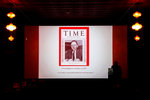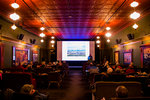


William O. Douglas wasn’t just the longest-serving Supreme Court Justice in history — the author of the most opinions on the bench. He was also a poor kid who grew up in Yakima, whose love for the mountains of Washington led him on wilderness adventures throughout his life.
That legacy — of a man just as much at home in the backcountry as making landmark decisions — was the focus of a presentation Tuesday by John Concillo, who has produced a short documentary on Douglas’s life and maintains a website that serves as a repository of information on the jurist.
“The challenge is what not to talk about with Douglas, because there’s so much material,” Concillo said before he addressed a crowd of several dozen at the Olympic Club in Centralia. “What I will fundamentally focus on is his work in individual rights, the First Amendment and being an environmental steward in a planetary sense.”
Concillo lived in Packwood during his childhood, and was stunned to realize the monumental figure whose books he was reading “grew up right over the hill.”
“That was pretty mind-blowing that this guy did this work and had this relatively important historical life and grew up in this little town over White Pass,” he said.
Though he’s collected information on Douglas his whole life, Concillo has been working on his project in earnest for the last seven years, following a career in broadcast television. The work is important, he said, because for all the significance Douglas had for the region and the country, he’s surprisingly not very well known.
“He definitely is not as in the foreground here as much as you would think he would be,” Concillo said. “I never understood why there isn't more name recognition, even just regionally. I was able to just get (the domain name) williamodouglas.org. That pretty much says it all in terms of his relative obscurity.”
That obscurity is what Concillo is seeking to change, with his film and website devoted to explaining the scope of Douglas’s legacy. He started Monday with a brief overview of his life.
Douglas was born in 1898, growing up poor in Yakima after the death of his father. After suffering from a childhood illness, he went hiking in the mountains to strengthen his legs, fostering a lifelong love for wild places.
He did well enough in school to attend Whitman College, then enrolled at Columbia to earn his law degree. After joining the faculty at Yale, he was appointed to the newly-formed U.S. Securities and Exchange Commission, where he had a role in implementing reforms to Wall Street in the midst of the Great Depression.
In 1939, President Franklin Roosevelt appointed Douglas to the Supreme Court, launching a career on the bench that would last more than 36 years. During his time on the court, Douglas earned a reputation as a civil libertarian, defending the rights of the individual in landmark cases ranging from First Amendment to privacy issues.
His work as a jurist may have been matched by his work as an environmental advocate. Whenever the court was not in session, Douglas was outdoors exploring, often back home in Washington. He used that pastime to advocate for public lands, leading hikes in Olympic National Park and along the C&O Canal near Washington, D.C. to protest roads that could have paved over natural areas (both protests were successful).
Concillo mentioned a dinner in Douglas’s honor that was attended by both leaders of the fledgling environmental movement and then-Senate Majority Leader Lyndon Johnson.
“He was this link between nascent small group of environmentalists and the power in the federal government bureaucracies,” Concillo said. “Without him these people would never been in the same room. You can’t overstate the importance of him in that role. It basically changed the atmospherics around these issues.”
Johnson would later sign the Wilderness Act into law.
Douglas was unafraid to be a personal advocate for the issues he cared about as well, willing to weigh in even aside from his role as a Supreme Court Justice — especially when it came to protecting his favorite places.
“Bill Douglas always insisted he had a First Amendment right like any other American citizen,” said Supreme Court Justice William Brennan, during an interview in Concillo’s film.
His legal theory on the “rights of nature” has laid the groundwork for much environmental work today, including a measure passed by voters Tuesday that will give Ohio residents the right to sue on behalf of Lake Erie if it’s in danger of environmental harm.
“This opinion of Douglas is what they’re catapulting off of,” Concillo said. “His legal principles are still being used in defense of the natural world.”
Concillo shared one humorous story in which well-dressed ACLU lawyers traipsed into the wilderness in search of Douglas — who was off on one of his jaunts — hoping to earn a stay on a particular case. They found him, but their request was denied.
Ultimately, a huge part of the Douglas legacy — and why he should be better remembered in the region — is “how much a Northwest guy he was,” Concillo said.
“Douglas spent a lot of time in this special area in the formative years of his life, and he really cherished this place,” he said. “He remained fundamentally tied to the Northwest. He spent as little time as he could in Washington, D.C.. ... He was always out here.”